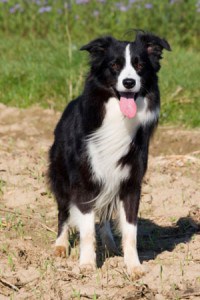Hi and Welcome Everyone!
This is Sharda with another Collie dog newsletter!
Now, here are some basic Border Collie training steps and strategies for an obedient pet!
Training your Border Collie does not have to be a difficult time in your life, or in the life of your Collie dog.
By following a few simple tips and strategies, the process can be pleasant and rewarding for all involved.
The major issue in training a Collie dog is to make sure that your Collie puppies are at the correct stage of its life to be able to understand and internalize the training.
The larger dogs such as Akitas, Shepherds, Rottweilers, Malamutes and Huskies tend to be very stubborn dogs and require firm and consistent training and work best with one trainer rather than multiple people.
Small breeds can also be very stubborn, and usually tend to bond closely with one or two people initially.
They can then come to respond to others appropriately later.
MAKE COLLIE DOG TRAINING FUN
Make sure that you are in a positive and enthusiastic mood when you begin training sessions. If you are tired, stressed or unhappy this will be communicated to the Collie dog, and it will make the session less pleasant and more difficult.
Take time to praise the Collie pups when something is done correctly.
Small healthy treats and lots of verbal praise, pets and hugs make the dog feel positive about training sessions.
Try to have a play session at the end of each training session when the session has gone well – this will help the puppy focus on the training.
In addition, always exercise your Collie puppies before the training session starts.
This allows their excess energy to be burned off and gives the puppy the opportunity to focus.
If a puppy is not exercised before training, it may be focused on running around and having fun rather than on the business of learning.
Most Collie puppies enjoy learning, being praised, and spending time with their owners.
They will look forward to these training times if they are done in a positive atmosphere where the puppy feels successful.
MAKE COLLIE DOG TRAINING NATURAL
Remember that Border Collie puppies are not full grown, nor do they have complete control of their body functions.
Take the puppy outside multiple times per day, and positively reward the puppy when it urinates or defecates outside.
This process can also work when the puppy sits on its own or comes to you. Catch them being good and reward swiftly.
KEEP COLLIE DOG TRAINING CONSISTENT
This is one of the most critical tips for Collie puppies. It is very hard for the puppy to understand expectations if they change from day to day or between people in the house.
Make sure that everyone is using the same commands with the puppy.
For example if one person is using “sit” and another is using “down” to get the puppy to sit on its bottom, the puppy will be confused.
This gets even more confusing if, when the puppy jumps up, he is told to “get down”. Keep commands simple and consistent.
Talk to other family members about the commands and expectations for the puppy. If you are attending a puppy training class, invite all the family to attend so they can see how the trainer is indicating the commands should be used.
PATIENCE IS THE KEY
Remember that Border Collie puppies are just like toddlers, and will need to be given lots of opportunity to learn.
Housebreaking is one of the first lessons that most people would like puppies to learn, but it is also one of the hardest.
Collie puppies have a small bladder and need to frequently urinate.
Take the puppy out for a short walk or exercise break at least every hour or two during the day. By avoiding situations where the puppy will have to mess in the house, you can positively reward for good behaviour.
Avoid having the TV on, or the children playing in the same area. Allow the puppy to focus as much as possible on the task at hand.
Remember also that puppies have a short attention span, so stop the training when you notice the puppy is beginning to “tune out”.
Short, frequent trainings will be more effective than long training sessions.
I hope that you have learned something important in today’s Collie dog newsletter.
All the best and take care.
Warmly,
Sharda Baker

